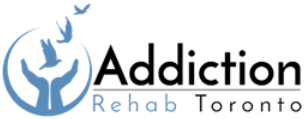Cognitive Behavioral Therapy or CBT has been found to be helpful for various disorders regarding addiction, binge eating, problem gambling, etc. and remains a standard manualized therapy for addressing addictive processes in the individual setting.

Cognitive Behavioral Therapy or CBT has been found to be helpful for various disorders regarding addiction, binge eating, problem gambling, etc. and remains a standard manualized therapy for addressing addictive processes in the individual setting.
The theoretical basis for Cognitive Behavioral Therapy is that there are interrelated relationships between what we think, what we do, and how we feel.
The focus of this approach is to identify automatic thoughts, a term that defines how clients experience distorted thinking, that might lead to a problem behaviour (Eg. “I need to get high to be ok”).
Clients report that their distorted thoughts come about in a reflexive manner, without prior reflection or reasoning. A main objective of CBT is to replace these automatic thoughts or substitute them with healthier thoughts, and to intentionally cultivate behavioural habits that disrupt problematic thoughts.
The goals of CBT are to correct clients’ faulty information processing, edit clients’ dysfunctional beliefs that maintain maladaptive behaviours and emotions, and offer clients with the skills and experiences that create adaptive thinking.
A common tool of CBT is utilizing mindfulness.Mindfulness refers to the capacity for acceptance, non-judgement, and moment-to-moment attention.
Rather than aiming to displace unhealthy thoughts or emotions, mindfulness training cultivates the practice of actively experiencing cognitive, physiological, or affective phenomena, however distressing they might be, with stillness, acceptance, and awareness.
Coupled with a behavioral intervention aimed at disrupting automatic patterns, mindfulness training helps addicted individuals develop a more deliberate and balanced approach their lives.
Components Of The Cognitive Behavioural Model
Situation:
Anything that happens to a person. A situation involving a certain person, place, thing or emotion might be triggering for someone.
Situations are ultimately outside of the person’s control, but they can be influenced by our behaviours & personal factors (psychological wellbeing/personality traits, genetic vulnerability, social/environmental factors)
How might our personality influence the situations we find ourselves in?How might our genetic, family and biological background influence the situations we experience?How does our social, cultural and physical environment play a role?
Emotions:
How a person feels about a situation. Emotions are not necessarily based in logic but they are influenced by thoughts and beliefs.Identifying emotions can be difficult for some people, especially when a person has spent years trying to deny, ignore or suppress their emotions.
Thoughts & Beliefs:
What a person thinks or feels about a situation and how they interpret the event. Thoughts reflect electro-chemical impulses in our brain. Thoughts are not statements of fact.
Epictetus, in the first century, said that “Men are not disturbed by things, but by the view they take of them”. CBT agrees that it is not the event which causes the emotion (and our behavioural reaction) but the meaning we give to the event – what we think about the event.
Which factors influence the evaluations and interpretations we make of situations?Particular types of thoughts lead to particular emotions (and subsequent behaviours).
How can we use CBT to challenge negative thoughts?
Behaviour/Response:
A person’s actions and behaviours in response to their thoughts and feelings about a situation. Generally speaking, in the context of mood, anxiety and substance use disorders, behaviours are used to decrease negative emotions.
Human beings do not enjoy negative emotions such as guilt, shame, anger and pain. It is a natural response to try and improve how one feels.
People may turn to substance use, gambling, or other problematic behaviours to try to cope, including oversleeping, avoiding situations and withdrawing from friends and family.
You may have observed that immediate behaviours have a tendency to provide short-term relief without actually addressing the cause of the problem. One of the goals of CBT and treatment is to help us access healthier long-term behaviours.
Thought Records
Thought records are another skill taught in CBT. They are founded on the premise that you don’t necessarily have to believe in every thought you have. Many of are thoughts are habit-driven and originate from false perspectives yet we have the tendency to accept what they say at face value.
A thought record is a way of putting your cognition to the test. It’s designed to help you alter your moods by finding a more balanced approach to your way of thinking about things.
Through identification, testing, reflecting etc. you are able to better understand your thoughts and their origins. This act of keeping a thought record turns your attention inward where you notice your thoughts and feelings.
More often than not, we are out of touch with what we are really thinking or feeling. When you take the time to shift your awareness internally, you slow down and begin to understand what’s going on psychologically.
Living in the struggle of active addiction is not easy. Finding the right addiction rehab can be just as hard. We know this because many of us have been there ourselves, suffering and in need of effective, high-quality care at an affordable cost.
Addiction Rehab Toronto is an expert addiction treatment and rehab facility. We offer programs of 30, 60 or 90 days, for those suffering from drug addiction and alcoholism.
Our individualized substance abuse treatment programs are designed to promote and facilitate long-term recovery. Our impressive success rate with past clients is a testament to our treatment methods and our staff.
We are a private residential addiction treatment facility located in a quiet neighbourhood of Toronto. We are a fee for service, and are not government funded (e.x. OHIP).
In the event where self payment is an issue, please inquire about our financing options or other ways in which we can help manage the cost.
© 2025 coursetakers.com All Rights Reserved. Terms and Conditions of use | Privacy Policy